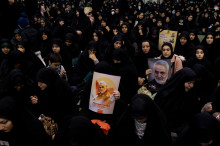It has been over a decade since New York Times reporter Dexter Filkins penned his best-seller, The Forever War.
As anticipated, the book raised important questions as to why the United States was still engaged in Afghanistan. Sadly, we are still there.
That is why I was drawn to a recent article: “Americans Demand a Rethinking of the ‘Forever War.’” Here is how it begins:
Nearly two decades after the fall of the World Trade Center and the attack on the Pentagon, American troops continue to wage war in Iraq, Afghanistan and lesser-known corners of the globe. President Trump almost opened another front last month when he approved the killing of Iran’s most powerful general.
“We took one of the world’s deadliest terrorists off the battlefield for good,” Secretary of State Mike Pompeo said recently, justifying the drone strike on Maj. Gen. Qassim Suleimani.
In other words, in the “war on terror,” the Iranian leader was fair game.
Last week, Democrats and some Republicans in the House voted to repeal one of two longstanding war authorizations that have helped justify all manner of American military action abroad. It was a challenge not only to President Trump’s ability to take military action against Iran, but also to the thinking in Washington that has sustained the war-fighting since the attacks of Sept. 11, 2001.
For more than 18 years, the war on terrorism — the “forever war” or “endless war,” as many call it — has been used as the basis for an ever-expanding range of military actions: an invasion of Iraq that, by one count, has left nearly 300,000 dead; airstrikes in Afghanistan that have sometimes unintentionally killed scores at wedding parties as well as Qaeda leaders; and now the Suleimani drone strike. Mr. Trump said the general, who had helped arm anti-American militias in the Iraq war, had been plotting new “imminent and sinister attacks.”


